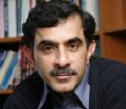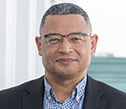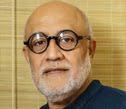IIHS has an International Advisory Committee (IAC) that provides advice and guidance on the development of IIHS as a leading institution integrating teaching, research and practice rooted in the realities of South Asia and the Global South. The IAC assists in fostering a culture of excellence, innovation and inclusion across IIHS’ Programmes and in mentoring IIHS faculty; deepening its size, capacities, and global and local engagement. It consists of internationally renowned urban scholars working on urbanisation issues in the Global South.
International Advisory Committee

BISH SANYAL
Ford International Professor of Urban Development and Planning, Department of Urban Studies and Planning, MIT
Bish Sanyal is the Ford International Professor of Urban Development and Planning and Director of the Special Program in Urban and Regional Studies (SPURS)/Hubert Humphrey program at the Massachusetts Institute of Technology (MIT). He served as Head of the Department of Urban Studies and Planning at MIT from 1994 to 2002 and was Chair of the MIT faculty from 2007 to 2009. Sanyal was awarded MIT’s prestigious award for teaching – the MacVicar Faculty Award – in 2011. Sanyal’s research, teaching and academic leadership reflect his multidisciplinary education in Architecture (B.A.) Urban Planning (MUP) and International Development Planning (PhD).
Sanyal has published extensively on urban development, particularly on the topic of spatial and economic integration of informal housing areas. He has also advised several bilateral and multilateral development agencies, along with governments in South Asia, Middle East, Africa, and Latin America. He also serves on the editorial board of six leading professional journals.
At present, Sanyal is advising the World Bank on a new initiative to evaluate the World Bank’s impact on influencing urban growth in developing countries. He is also advising Indonesia’s central planning agency, and the Bandung Institute of Technology on the relocation of the Indonesian capital from Jakarta to Kalimantan.
Sanyal recently completed a 10-million-dollar research project (sole Principal Investigator) to create a comprehensive initiative technology evaluation (CITE) at MIT.
He was awarded the highest professional award—the Distinguished Educator Award—by the Association of Collegiate Schools of Planning Inc. (ACSP) in 2021.
 CAREN LEVY
CAREN LEVY
Professor of Transformative Urban Planning, Bartlett Development Planning Unit, University College London
Caren Levy is Professor of Transformative Urban Planning at the Bartlett Development Planning Unit (DPU), Faculty of the Built Environment, University College London (UCL). She is an urban development planner with over 35 years’ experience of teaching, research, training and consultancy. She works on urban planning, community-led development and governance with a focus on housing, transport and infrastructure and land management in urban areas in the Global South. She has a special interest in the institutionalisation of social justice in policy and planning, particularly related to cross-cutting issues of gender, diversity and the environment. With a strong commitment to contributing to transformative practice, she has explored and developed innovative approaches to planning methodology, planning education and capacity building. She works in London and with partners in a range of cities in Africa, Asia, Latin America and the Middle East with communities, governments and international organisations.
Caren Levy was Principal Investigator (PI) of a 4 ½ year GCRF supported research and capacity building programme, Knowledge in Action for Urban Equality (KNOW) (2017-22), which worked with 13 partners across 12 countries in Africa, Asia and Latin America. She is a former Director of the Bartlett DPU (2005-12) and Vice Dean International for the Bartlett Faculty of the Built Environment (2012-18).

DEVESH KAPUR
Starr Foundation Professor of South Asian Studies and Director of Asia Programs, School of Advanced International Studies, Johns Hopkins University
Devesh Kapur is Director of the Asia Programme at the Paul H. Nitze School of Advanced International Studies (SAIS) at Johns Hopkins University, Washington D.C. From 2006 to 2018, he was the Director of CASI, Professor of Political Science at the University of Pennsylvania and held the Madan Lal Sobti Chair for the Study of Contemporary India. Prior to that, he was Associate Professor of Government at the University of Texas at Austin and the Frederick Danziger Associate Professor of Government at Harvard University.
His research focusses on human capital, national and international public institutions and the ways in which local-global linkages, especially international migration and international institutions, affect political and economic change in developing countries, especially India. His book “Diaspora, Democracy and Development: The Impact of International Migration from India”, published by Princeton University Press in 2010, earned him a Distinguished Book Award from the International Studies Association. His recent books include “The Other One Percent: Indians in America”, (co-authored with Nirvikar Singh, and Sanjoy Chakravorty) and published in 2016 by Oxford University Press; The “Costs of Democracy: Political Finance in India”, (co-edited with Milan Vaishnav) and published in 2018 by Oxford University Press; and “Regulation in India: Design, Capacity, Performance” (co-edited with Madhav Khosla), Hart Studies in Comparative Public Law, published in 2019. His most recent (co-edited) book, The Oxford Handbook of Higher Education in Asia and the Pacific, is forthcoming in August 2022.
 EDGAR PIETERSE
EDGAR PIETERSE
Director, African Centre for Cities (ACC) and South African Research Chair in Urban Policy, University of Cape Town
Edgar Pieterse is an urban scholar, writer, curator and creative agent whose interests include the theory and practice of policy discourses and interventions to make the African city more just, open and accessible. He holds the South African Research Chair in Urban Policy at the University of Cape Town and is Director of the African Centre for Cities. Formerly a special policy advisor to the premier of the Western Cape, Pieterse is the author of “City Futures: Confronting the Crisis of Urban Development” (2008), and “New Urban Worlds: Inhabiting Dissonant Times” (2017), co-authored with A M Simone. He is also co-editor of “Africa’s Urban Revolution” (2014) and “Rogue Urbanism: Emergent African Cities” (2013). He is a member of the Research Advisory committees of the Gauteng City-region Observatory and LSE Cities. He was co-lead author of the Urban Chapter for the International Panel on Social Progress.
 MICHAEL A COHEN
MICHAEL A COHEN
Director of International Affairs, Milano School of International Affairs, Management and Urban Policy; Professor & Director of International Affairs, The New School for Public Engagement, New York
Michael Cohen is an urban and development policy specialist currently serving as Director of International Affairs at the Milano School of International Affairs, Management and Urban Policy; and Professor and Director of International Affairs at the New School for Public Engagement. He teaches courses on smart cities and urban values, the urban century, slums and urban development and urban strategies.
He worked at the World Bank from 1972–1999 and was responsible for much of the Bank’s urban policy development during that period. From 1994–1998, he served as the Senior Advisor to the Bank’s Vice-President for Environmentally Sustainable Development.
Cohen has worked in 55 countries and was involved in the World Bank’s work on infrastructure, environment and sustainable development. He has published several books on urban development, central Africa and the impact of development assistance. Cohen has advised governments, NGOs and academic institutions around the world. He was a member of the Infrastructure Panel and Urban Dynamics Panel of the US National Academy of Science. He has helped the United Nations Human Settlements Programme (UN–Habitat) prepare its Global Report on Human Settlements from 2005–2012. He received his PhD in Political Economy from the University of Chicago.

RAHUL MEHROTRA
Chair Urban Planning & Design at Graduate School of Design, Harvard University and the John T. Dunlop Professor in Housing and Urbanization
Rahul Mehrotra is a Professor of Urban Design and Planning and the John T. Dunlop Professor in Housing and Urbanization at the Graduate School of Design at Harvard University and has been a Founding Member of the IIHS Board since 2008. He is the Founder Principal of RMA Architects which has studios in Mumbai and Boston. RMA Architects was founded in 1990 and has designed and executed projects including for government and private institutions, corporate workplaces, private homes, and unsolicited projects driven by the firm’s commitment to advocacy in the city of Mumbai. In 2012-2015, he led a Harvard University-wide research project with Professor Diana Eck, called The Kumbh Mela: Mapping the Ephemeral Mega City. This work was published as a book in 2014 and the research extended in 2017 in the form of a book titled Does Permanence Matter?. Mehrotra also co–authored a book titled Taj Mahal: Multiple Narratives, which was published in Dec 2017. His most recent books are titled Working in Mumbai (2020) and The Kinetic City and Other Essays (2021). The former, a reflection on his practice, evolved through its association with the city of Bombay/Mumbai. The second book presents his writings over the last thirty years and illustrates his long-term engagement with and analysis of urbanism in India. This work has given rise to a new conceptualisation of the city which Mehrotra calls the Kinetic City.
 WILLIAM (BILLY) COBBETT
WILLIAM (BILLY) COBBETT
Former Director, Cities Alliance (2006-2021)
William Cobbett’s three decades of development experience began with his appointment in 1988 as Overall Coordinator of PLANACT, an urban NGO based in his native Johannesburg. In this role, he was closely involved in providing strategic and policy support to trades unions and civic associations operating under a national State of Emergency in the last years of apartheid. Under his leadership, PLANACT played an instrumental role in supporting organisations fighting for a non-racial and democratic future, which also included close support in the first local level negotiations with the minority regime.
After the unbanning of political organisations, he was invited by Secretary General Ramaphosa to move to ANC headquarters in 1992, where he lead the negotiating team representing the ANC on the multi-party National Housing Forum (NHF). He was subsequently involved in the ANC’s negotiating team at CODESA, and was a lead negotiator on hostels in the Record of Understanding (1992), which paved the way for South Africa’s elections. Prior to the 1994 elections, he represented the ANC on the Transitional Executive Council (TEC), which provided oversight in the immediate period prior to the historic democratic elections in 1994.
In the Government of National Unity under President Nelson Mandela, Cobbett was appointed Director General of the National Department of Housing, reporting to Minister Joe Slovo. Following the hosting of the National Housing Summit in Botshabelo in October he supported Minister Slovo in finalising South Africa’s first non-racial housing policy, which was adopted in December 1994.
Following his controversial removal from office in 1997 for exposing an irregular housing deal, he was appointed Director of Housing in Cape Town, where he oversaw the overhaul of the city’s housing policy. The new policy also cost him his job, as he left the country in 1998 following threats from gangs exploiting residents on the Cape Flats.
After leaving South Africa, Cobbett moved to Nairobi after being recruited to advise the acting Executive Director of UN-Habitat (then UNCHS) on the post-Habitat II direction of the organization. He was subsequently invited to assist the transition and was appointed Acting Chief of the Shelter Branch, in which capacity he proposed and designed the UN’s Global Campaign for Secure Tenure, representing the UN at the Campaign’s launch with the National Slum Dwellers Federation (NSDF) of India in Mumbai, 2000.
At the request of the UN-Habitat, Cobbett relocated with his family to the World Bank in Washington DC, where he joined the Secretariat of the newly-created Cities Alliance as Senior Urban Upgrading Advisor. In 2006, he was competitively recruited as the new Manager of the Cities Alliance. Under his leadership, the Cities Alliance is internationally recognised both for the diversity of its membership and for its role in sharpening policy makers’ focus on urban poverty and informality, including in secondary cities. In 2013, Cobbett oversaw the relocation of the Cities Alliance to Brussels, where it is now based. After 21 years with the Cities Alliance, fifteen of which as Director, he retired in March 2021.
Billy has an Honours degree in History from Middlesex University, London. He is co-editor with Robin Cohen of “Popular Struggles in South Africa” published by James Currey in association with the Review of African Political Economy (ROAPE) in 1988.



